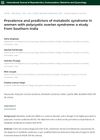 59 citations,
August 2007 in “Clinical Endocrinology”
59 citations,
August 2007 in “Clinical Endocrinology” The current methods for diagnosing polycystic ovary syndrome are too vague and may lead to misdiagnosis and problems in research.
 38 citations,
May 2006 in “Archives of Gynecology and Obstetrics”
38 citations,
May 2006 in “Archives of Gynecology and Obstetrics” Women with only irregular periods or excess hair have a better hormone profile than those with full PCOS, but both groups are similar, indicating a need for better PCOS diagnosis methods.
 30 citations,
October 2014 in “Journal of The American Academy of Dermatology”
30 citations,
October 2014 in “Journal of The American Academy of Dermatology” A team approach is crucial for managing PCOS, with dermatologists playing a key role.
 21 citations,
September 2019 in “Archives of Physiology and Biochemistry”
21 citations,
September 2019 in “Archives of Physiology and Biochemistry” High-intensity interval training improves certain hormone levels and lipid profiles in women with PCOS.
 18 citations,
December 2014 in “Obstetrics and Gynecology Clinics of North America”
18 citations,
December 2014 in “Obstetrics and Gynecology Clinics of North America” Losing 5-10% body weight can improve PCOS symptoms, letrozole is better than clomiphene for fertility, and managing weight and blood sugar is important to reduce pregnancy complications.
 3 citations,
June 2004 in “Reviews in gynaecological practice”
3 citations,
June 2004 in “Reviews in gynaecological practice” Early treatment and weight management are important for teenagers with PCOS to reduce symptoms and long-term health risks.
 69 citations,
December 2005 in “Nature Clinical Practice Endocrinology & Metabolism”
69 citations,
December 2005 in “Nature Clinical Practice Endocrinology & Metabolism” Blocking the enzyme 11β-HSD1 might help treat obesity and metabolic issues.
 12 citations,
August 2011 in “European Journal of Endocrinology”
12 citations,
August 2011 in “European Journal of Endocrinology” Anti-Müllerian hormone is a specific marker for ovarian issues in women with conditions like PCOS.
 51 citations,
March 2004 in “Hormone and Metabolic Research”
51 citations,
March 2004 in “Hormone and Metabolic Research” Women with Polycystic Ovary Syndrome have higher levels of the hormone ghrelin, which may be linked to the cause of the condition.
6 citations,
October 1998 in “Journal of endocrinological investigation” Antiandrogens help manage PCOS symptoms but need careful monitoring.
 19 citations,
January 2019 in “Ginekologia Polska”
19 citations,
January 2019 in “Ginekologia Polska” The combined Myo-inositol and D-chiro-inositol treatment improved weight, hormone levels, and skin conditions in women with PCOS.
 6 citations,
January 2015 in “International journal of reproduction, contraception, obstetrics and gynecology”
6 citations,
January 2015 in “International journal of reproduction, contraception, obstetrics and gynecology” More than half of the women with PCOS in Southern India had Metabolic Syndrome, with large waist circumference being the most common feature.
 14 citations,
May 2013 in “American Journal of Physiology-endocrinology and Metabolism”
14 citations,
May 2013 in “American Journal of Physiology-endocrinology and Metabolism” Removing myelin protein zero-like 3 in mice leads to better metabolism and resistance to obesity.
 2 citations,
February 2023 in “BMC women's health”
2 citations,
February 2023 in “BMC women's health” Birth control pills change the activity of certain inflammation and blood clotting genes in women with PCOS.
 116 citations,
December 2017 in “International Journal of Women's Dermatology”
116 citations,
December 2017 in “International Journal of Women's Dermatology” Adult female acne treatment should be personalized, considering individual preferences and pregnancy, using various topical and oral medications while managing side effects and resistance.
4 citations,
January 2018 in “JBRA assisted reproduction” Orlistat helped reduce weight and testosterone in obese women with PCOS but did not significantly affect other androgens or cholesterol levels.
13 citations,
March 2012 in “The American Journal of Surgery” Modified laparoscopic sleeve gastrectomy effectively controls diabetes and treats obesity with minimal complications.
 10 citations,
April 2018 in “Maturitas”
10 citations,
April 2018 in “Maturitas” Excess male hormones in postmenopausal women can cause health issues and increase the risk of heart disease and diabetes; treatment depends on the cause.
 7 citations,
January 2022 in “Animal Reproduction”
7 citations,
January 2022 in “Animal Reproduction” Using rodents for research shows that health problems in the womb can cause diseases later in life.
 128 citations,
September 2011 in “British Journal of Dermatology”
128 citations,
September 2011 in “British Journal of Dermatology” Obesity is linked to various skin problems and may increase the risk of skin cancer.
 11 citations,
September 2012 in “Journal of obstetrics and gynaecology Canada”
11 citations,
September 2012 in “Journal of obstetrics and gynaecology Canada” Testosterone therapy seems safe for short-term use in postmenopausal women with low sexual desire, but more research on long-term effects is needed.
 October 2018 in “Journal of Clinical Research in Pediatric Endocrinology”
October 2018 in “Journal of Clinical Research in Pediatric Endocrinology” Children with classic congenital adrenal hyperplasia have thicker heart fat and more heart and blood vessel risk factors, especially if their condition is not well-controlled.
 54 citations,
December 2007 in “Best Practice & Research Clinical Endocrinology & Metabolism”
54 citations,
December 2007 in “Best Practice & Research Clinical Endocrinology & Metabolism” Targeting glucocorticoid action might help treat type-2 diabetes, but human trials are needed.
 2 citations,
October 2022 in “Frontiers in genetics”
2 citations,
October 2022 in “Frontiers in genetics” Late diagnosis of congenital adrenal hyperplasia can greatly affect physical development, gender identity, and sexual health.
 January 2001 in “Clinical and Experimental Dermatology”
January 2001 in “Clinical and Experimental Dermatology” A test for nail fungus was most accurate with PAS stain, low-dose spironolactone helped two-thirds of acne patients, metformin reduced symptoms of HIV-related fat distribution changes with some side effects, and skin examination with dermoscopy was better at detecting abnormal moles, while temporary tattoos can cause skin reactions.
 2 citations,
January 2012 in “Journal of metabolic syndrome”
2 citations,
January 2012 in “Journal of metabolic syndrome” The document concludes that hirsutism can be managed with various treatments tailored to the individual, potentially improving quality of life.
January 2024 in “Medicina” Statins may help treat PCOS by lowering androgen levels and improving cholesterol.
 January 2023 in “Advances in reproductive sciences”
January 2023 in “Advances in reproductive sciences” Higher levels of the protein Pannexin-1 may play a role in hair loss in women with PCOS.
 September 2018 in “Fertility and Sterility”
September 2018 in “Fertility and Sterility” African American women have a higher risk of preterm delivery than Caucasian women, and inflammatory stimuli affect gene expression in cells related to PCOS, showing a heightened inflammatory state in women with PCOS.
 49 citations,
November 2019 in “Egyptian Journal of Medical Human Genetics”
49 citations,
November 2019 in “Egyptian Journal of Medical Human Genetics” Certain gene variants may contribute to high androgen levels in women with polycystic ovary syndrome.


























